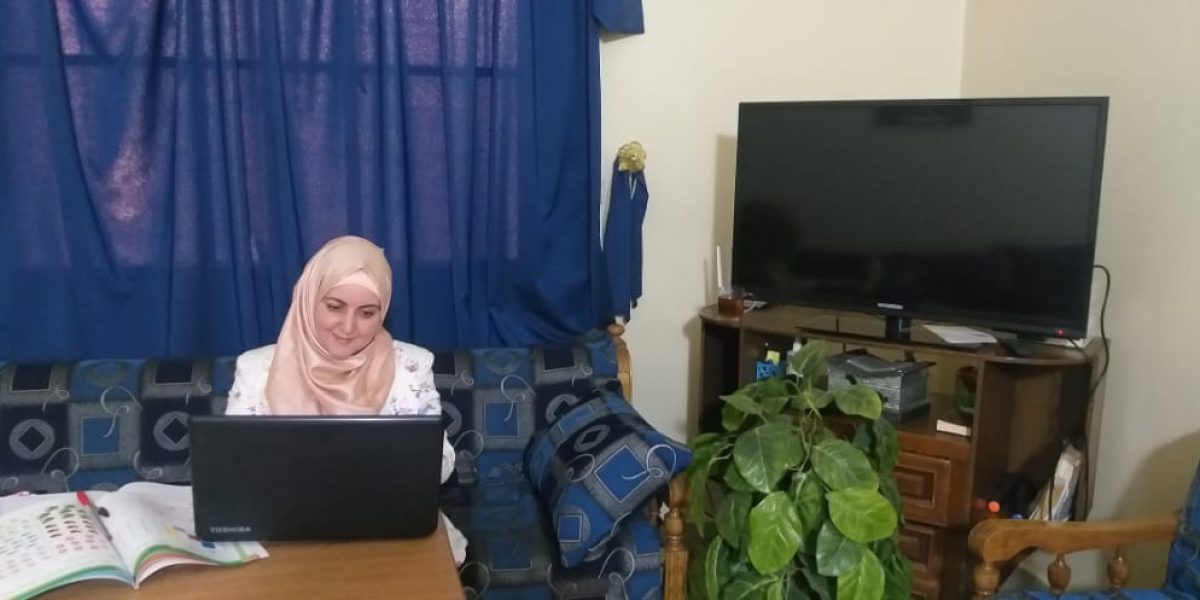Lebanon: Reshaping JRS Education During Quarantine
14 July 2020|Nadine Malli, Communications Officer, JRS Lebanon

“At JRS, we are always ready for any emergency situation,” Rouba tells us when we spoke with her about her experience as a JRS tutor at Dar Al Hanan School in Baalbek, Lebanon. Rouba began her education career 12 years ago as a volunteer and became fascinated by the profession. She joined JRS in 2016 and now teaches KG3 students in English, science, and math.
She loves being around children and is very excited to help raise a generation of educated youth.
In an effort to continue JRS education programming during the pandemic, JRS schools transitioned to online learning in March. The decision to continue with the school year through online learning was a team effort which required planning and collaboration among the JRS Baalbek office and school staff; coordination with parents and students, and a one-week trial period in which online learning was piloted with select classes before rolling out the new programming to all students.
“When we shifted to online learning, we defined our objectives with the supervisors and the school principal. Then, we agreed on how to communicate with the students. We created WhatsApp groups for this sake,” Rouba says, describing her journey in online learning.
Following the emerging norms of social distancing and self-quarantine, Rouba transformed her home into a workplace. Rouba leads her KG3 students in online learning five days a week from 9.00 am to 1.30 pm via a WhatsApp group, which includes students and parents, as well as the school principal and school administrator.
We spoke with her during Ramadan, when WhatsApp groups were curtailed by one hour in order to accommodate observance of fasting.
The upsides and downsides of online learning
Rouba was impressed by some students who performed better from home. “There is a student, for example, who used to find it very difficult to stay in his place in the class and was unable to focus for a long time. In comparison, now he is managing to stay for a long time studying on the WhatsApp group,” she says.
“He is able to pronounce the words properly as he is always sending voice notes which improved his speaking. Other students used to be very timid in the class, but now their participation has increased on WhatsApp.”
Rouba believes that the phone, once a distraction for children, has been transformed into an educational tool.
The adoption of online learning has provided parents with the opportunity to follow up more with their children and the tutor. Parents now communicate with tutors daily, as well as with the school social worker on a separate WhatsApp group, where parents can freely share any questions or concerns.
However, online learning doesn’t come without caveats. In the classroom, Rouba is able to ensure students understand the lessons and it is easier for her to follow up in person rather than through WhatsApp.
“In math, for example, I usually use practical exercises to explain the lesson. Now this is not possible through a screen. Science experiments are halted as some students don’t have the materials needed for the experiment at home.”
Speaking further on the challenges of online learning, Rouba finds that lack of electricity and access to internet are obstacles for both the tutor and students. “Once, I went to my neighbor’s house because the electricity went off while I was explaining the lesson. One of my students did the same because the internet was not available on the phone, and it costs a lot for her parents to provide it.”
Additionally, prolonged use of a mobile device may cause problems for children’s eyesight or physical pain.
Maintaining a balanced life during quarantine
Rouba made a schedule to maintain a healthy work-life balance which enables her to better meet her professional and family needs.
”Sometimes, I practice yoga with my children, or we play puzzles. I motivate them to keep practicing their hobbies. Once I pushed my daughter to participate in a drawing contest, and I always encourage my son to keep learning new electronic skills.”
She also started a small garden on her roof, reusing plastic containers to plant potato, cucumbers, mint, and lettuce. “I don’t have a garden or a place to plant so I used the roof, and I am very happy with the result that I got. Now, I can eat fresh vegetables and share them with my neighbors as well,” says Rouba excitedly.

Rouba is happy that her skills, such as the use of new mobile phone applications and video editing, have improved during the quarantine.
She now knows that she is capable of learning anything, and that nothing will stop her, not even a pandemic.



